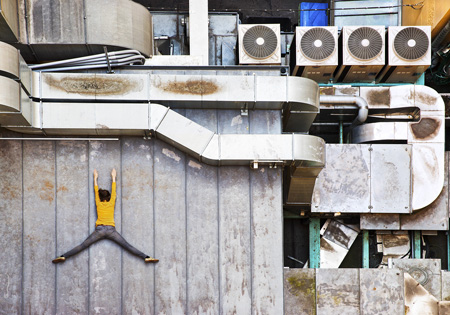 |
The exhibition "I Do Not Feel
Free to Do What I Want" is based on a bilateral cooperation
between an art institution from Kharkiv, Ukraine and another one from
Graz, Austria. The Municipal Gallery Kharkiv and < rotor > centre
for contemporary art, Graz decided to go into a longer exchange of artists,
curators and finally exhibitions. In summer 2019 two artists from Kharkiv
– Olga Fedorova and Anna Manankina – have been on a residency
in Graz and vice versa Helene Thümmel from Graz spends October in
Kharkiv. Finally, on October 21st and 22nd an exhibition will be opened
at two premises with 14 artists participating, each seven from Ukraine
and from Austria.
The exhibitions topic focuses on the notion of individual freedom. "Freedom
consists of doing anything which does not harm others" is a common
definition of the limits of individual freedom to be found in this wording
in the Declaration of the Rights of Man and of the Citizen of
the French National Assembly of 1789. In the Universal Declaration
of Human Rights of 1948, however, this fundamental and at the same
time far-reaching wording can no longer be found. In this document, which
has been signed by almost all the nation states of the world and elevated
to constitutional status by some, individual freedoms are described only
in a few sub-areas, for example with regard to privacy to be protected
and freedom of movement to be maintained. But these two areas alone make
it clear that in many places individual freedom is not in very good shape,
in times of total surveillance of public space and means of communication,
of payment flows, of medical records.
In the context of the neoliberal economic order, the matter of individual
freedom becomes an illusion. Under the dictates of the "free market",
the individuality and personal freedom of the winners of this system is
apparently upheld, but the scope of choices is also limited for them.
Individuals can realize themselves, but only if they improve the efficiency
and function within the system of profit maximization. Not to mention
the many more losers of this system.
Irrespective of the political and economic framework conditions, there
is a fundamental factor that allows individual freedom to be interpreted
and perceived in very different ways. This factor is the human being as
such: The core of freedom is – beside the above mentioned parameters,
and for sure some more – a choice that is always associated with
the intellectual and emotional-volitional tension of a person.
Society and its political, social and economical conditions form the framework
for individual freedom. But, if absolute freedom hypothetically existed,
how would a person be able to imagine it? Would it be the very same freedom
that you and I are used to understand?
A joint project of Municipal Gallery Kharkiv and
< rotor > centre of contemporary art, Graz
The project takes place with the support
of the Austrian Federal Chancellery, Arts and Culture Division. We thank
the Austrian Cultural Forum Kyiv for supporting the shipment.


The residencies of Olga Federova and Anna
Manankina
in Graz were supported by Cultural City Network Graz and
the Ukrainian Institute, Kyiv, respectively.
<<
|

